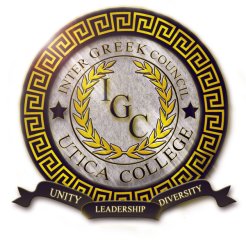

Greek Life
Joining and participating in Greek organizations is a great way of enhancing your experience at Utica University.
Greeks Today, Leaders Tomorrow.
Fraternities and sororities mean more than just wearing letters, attending meetings and going to social events. It is a feeling and sense of belonging. Making life long friends and being yourself and being respected for your individuality. More importantly, it’s your family away from home.
Greek Organizations at Utica University
Fraternities
Utica University No-Hazing Policy
Utica University defines hazing to include any action that intentionally or recklessly causes or poses a substantial risk of harm to the mental or physical health or safety of one or more persons. Violations of this policy will result in referral to Judicial Affairs and possible disciplinary actions.
- For more information or if you would like to report a hazing incident please contact Lauryn Moore in the Office of Student Living and Campus Engagement at 315-223-2598.
- To view full policy, see "No Hazing Policy" below.
More about Greek Life at Utica:
- Service: Fraternities and sororities at Utica Universityspend thousands of hours a year doing community service projects and raising money for charities. Each chapter has its own philanthropy, which serves at a local and national level, but all donate services to local agencies. Fraternities and sororities are involved in a wide variety of activities on the Utica campus.
- Scholarship: Greek lettered organizations were founded on the principal of scholarship and achievement. At Utica University the all Greek average is consistently higher than the all undergraduate average. Academics are the reason you come to Utica and the fraternities and sororities performance reflects their commitment and standard to scholarship. Studies indicate that more students in sororities and fraternities stay in school through graduation than do unaffiliated students.
- Social: Utica University Greek life system provides a diverse selection of events to expose members to a wide variety of social programs. Formals, Homecoming, Greek Week, Mixers, parents dinners, individual organization retreats, National and local conferences all support the goal of bringing members together to develop the bonds of brotherhood and sisterhood.

Greek Facts:
- Students with membership in a fraternity or sorority are more likely to complete college.
- College graduates who were members of a fraternity or sorority tend to be more financially successful than those graduates not in Greek organizations.
- Colleges receive more donations - and in greater amounts - from sorority and fraternity alumni.
- Sorority and fraternity members participate in more campus activities and in more community service after college than others.
- The first fraternity was founded in 1825 at Union College, Schenectady, NY.
- The first sorority was founded in 1851 at Wesleyan College, Macon, GA.
- Seventeen of the last twenty-five US Presidents have been members of fraternities.
- Both female members of the US Supreme Court are members of sororities. Greeks, nationally, complete over 10 million hours of volunteer service annually.

Mission
The InterGreek Council (IGC) of Utica University exists to enhance Greek life through involvement in the college community, establishing pledge and rush policies conducive to the pre-established rules of the institution, through the involvement in community service projects, by enforcing Inter-Greek Council rulings through judicial action when IGC or institutional policy has been violated, and by establishing guidelines for the Greek population within boundaries that will not affect the uniqueness of each organization.
Joining a Greek-letter Organization at Utica
Fraternities and sororities select their members through a recruitment process. The membership selection process for the ethnically-based organizations is called intake.
Recruitment: The membership selection process or recruitment occurs each semester, although some organizations only conduct membership recruitment on a continuous basis. The continuous recruitment process can be more of an informal recruitment process in which each group selects its members independently; however, each organization has a common recruitment period and recruitment orientation and informational events.
Note: All recruitment activities must be dry (i.e., no alcoholic beverages permitted).
Minimum Requirements:
Each semester, students are offered a variety of opportunities to learn about and join Greek-letter organizations. To become involved, students either participate in recruitment or attend informational/interest meetings.
To join:
- You must be regularly enrolled in classes at Utica
- You must have a minimum 2.0 grade point average and are required to be in good academic standing (not on academic probation).
- All interested members must attend Greek 101, a program which includes identifying and responding to hazing and be approved by the fraternity and sorority advisor.
Individual organizations have minimum grade point average requirements, however, the 2.4 GPA requirement set by Utica must be met to be considered for membership. Most chapters also have additional requirements regarding community service and other requirements.
New Member Education:
Students become fully acquainted with the chapter and its members during the new member education process. In this period new members learn about their chapters, including the national organization structure (if applicable), values, expectations, traditions and rituals.
In addition:
- At any time before initiation, new members may "de-pledge" if they feel the organization is not right for them.
- Hazing is strictly prohibited by Utica as outlined in the Inter Greek Council Constitution and Student Code of Conduct.
Upon the successful completion of the new member education process, students will be initiated into the chapter. Initiation is the formal conferring of the chapter’s rights and privileges to a member. Once initiated, members of Greek chapters enjoy the rights and privileges, as well as the responsibilities that come with affiliation.
Financial Obligations:
Though joining a Greek Organization does carry a financial commitment, typically the first semester of membership is usually more expensive than the second because of initiation cost. On average, costs could run anywhere from $40 a semester to $500. Interested members should check with each individual organization as memberships and pledging dues may vary.
Utica University No-Hazing Policy
Utica University defines hazing to include any action that intentionally or recklessly causes or poses a substantial risk of harm to the mental or physical health or safety of one or more persons. Subjecting any person to and/or encouraging any person to commit an act that violates human dignity, the Code of Student Conduct, or the law for the purpose of initiating, promoting, fostering, or confirming any form of affiliation with a group or organization is prohibited. The express or implied consent of participants or victims will not be a defense.
Hazing and abuse are expressly prohibited. These include, but are not limited to: forced consumption of alcohol or other substances, sleep deprivation, threats of harm, actual physical harm (e.g., paddling, beating, branding), performing any service or action under coercion or duress.
a) Physical Hazing
Several examples are paddling, beating, slapping, kicking, pushing; sleep deprivation, duck walking, and tearing clothes, consumption of alcohol, use of drugs, forcing the use of alcohol or drugs.
b) Emotional/Psychological Hazing
Several examples are cursing, yelling, humiliating, belittling; any morally degrading, illegal or indecent activity; any type of activity that is in violation of legal statutes or policies of the resident locale, i.e. college, city, state, etc.
- Unapproved work and/or other activities: any road trip that would make it necessary for a prospective member to travel extreme distances or under hazardous conditions or any activity that would endanger a prospective member.
- Requiring or accepting services from prospective members, including but not limited to visits, errands, buying food, gifts or personal items, being a personal chauffer etc.
Hazing poses substantial risks to the safety and well being of individual students and the University community. As such, violations of this policy will result in referral to Judicial Affairs and possible disciplinary action which may include, but not be limited to, any or all of the following:
- suspension or expulsion from the institution, loss of recognition and privileges,referral to law enforcement, participation in educational programs, and other educational or remedial action appropriate to the circumstances.
Hazing is punishable under New York State Law as follows:
1. New York Penal Law 120.16; Hazing in the First Degree:
- A person is guilty of hazing in the first degree when, in the course of another person's initiation into or affiliation with any organization, he intentionally or recklessly engages in conduct which creates a substantial risk of physical injury to such other person or a third person and thereby causes injury. Hazing in the First Degree is a class A misdemeanor.
2. New York Penal Law 120.17; Hazing in the Second Degree:
- A person is guilty of hazing in the second degree when, in the course of another person's initiation or affiliation with any organization, he intentionally or recklessly engages in conduct, which creates a substantial risk of physical injury to such other person or a third person. Hazing in the second degree is a violation.
Utica and the Inter Greek Council have a zero tolerance hazing policy. Any accusations of hazing will be taking very seriously. Utica will enforce this policy through internal disciplinary procedures, the external prosecution of alleged offenders, or both. Individuals who participate in acts of hazing will be held accountable under this policy, all other IGC policies, and the Code of Student Conduct.
For more information or if you would like to report a hazing incident, please contact Lauryn Moore in the Office of Student Living and Campus Engagement at 315-792-3840.
Contact Us
Alexander R. Hodkinson, M.S.Ed.

Alexander R. Hodkinson, M.S.Ed.
Assistant Director of Campus Engagement
(315) 792-3901
What's Happening at Utica

The Ideal Co-Author
Grace VanEtten ’26 is handpicked by Professor Christopher A. Riddle to share authorship in prestigious bioethics journal

Introducing Campus Catch-Up
A new podcast launching from Utica University hopes to meet the community where they are in this digital era. Campus...

Utica University Announces Fall 2025 High Honors and Dean’s List
Provost and Senior Vice President for Academic Affairs Ann Damiano has announced the Utica University Fall 2025 semester High Honors...
I would like to see logins and resources for:
For a general list of frequently used logins, you can also visit our logins page.
